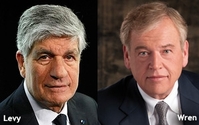Clashing Cultures, Delay And Uncertainty Killed POG
- by Larissa Faw , Steve McClellan @mp_mcclellan, May 9, 2014
 Corporate
cultures that were too far apart, a multiple-front approval process that still had no end in sight, and the escalating uncertainty among shareholders and clients killed the $35 billion POG merger --
the biggest proposed deal in Adland history.
Corporate
cultures that were too far apart, a multiple-front approval process that still had no end in sight, and the escalating uncertainty among shareholders and clients killed the $35 billion POG merger --
the biggest proposed deal in Adland history.
At least that’s how the CEOs of Publicis and Omnicom explained the deal’s collapse in separate conference calls Friday morning.
"It was not China, or tax concerns in the UK and Netherlands taken individually," said Publicis Groupe CEO Maurice Levy. "What was becoming a big problem was the combination of these issues combined with what we could see is a drift in our business model. And that the balance of merger of equals could be broken. We were running the risk of building uncertainty and if there is something investors and stockholders hate, it is uncertainty."
advertisement
advertisement
And while Omnicom CEO John Wren acknowledged that on the regulatory front, there still was “no clear finish line in sight” after nine months of working through the process, he also admitted that the corporate cultural divide turned out to be insurmountable. He said if he had to tweet an analysis of the deal’s collapse it would read: “Corporate culture, complexity and time.” He added that he knew going in there would be differences on the business culture front. “I know now we underestimated the depth of differences in corporate culture,” which was impeding the decision making process.
And Levy acknowledged that there were unresolved spats over who should be in what roles going forward. He commented that some of the people who would have been in charge didn't know anything about Publicis Groupe, which would have led to a dilution of its unique differentiation. "We had merger of equals," says Levy. "We had discussed a good balance of responsibilities, people and positions. But we had a hard time to build that balance. And this would create a risk with our people and delivering what we wanted to deliver."
The collapse came as a relief to some employees. Omnicom CFO Randall Weisenburger said that he received perhaps 100 texts from employees Thursday night after the deal’s demise was confirmed. The overall tenor of the comments, he said, was that the Omnicom team seemed “energized and ready for the future.”
Wren said major clients were notified Thursday about the development. The responses he said were positive with the message that it was “better to do what we did than enter a bad marriage.” Levy also threw out a marriage analogy: "It is disappointing that instead of going to the church to get married, we are going to the judge and divorcing."
And for those who thought -- and a lot of people did -- that the merger was about scale and competing against Silicon Valley behemoths like Google, Omnicom said that was a miscommunication. “We never said scale was needed,” said Weisenburger. “It was an opportunity and that’s a big difference.” It was a particular opportunity in the media, production and procurement sectors, he said. “Maybe at the launch we were not as clear as we could have been” on that point.
Asked by one BBDO employee on the call what changes there would be for staffers now that the deal is off, Wren replied: “Nothing changes with respect to our culture,” which he described as one of “learning and collaboration.”
There were signs early on in the POG merger process that actually completing the deal would be more challenging than either side imagined. Reports early on suggested there was much squabbling over how to organize big portions of the two companies, such as the media and digital divisions and who would run them, as well as the choice of a CFO for the new company.
But the first overt signal from either company to the outside world that it might want to ponder the possibility that the deal might implode came on April 17th when Levy uttered his “Life is good no matter what happens” comment while discussing first-quarter financial results.
The pessimistic outlook accelerated a week later when Omnicom CEO John Wren expounded in detail on some of the hurdles, like obtaining certain tax concessions in France as well achieving tax residency in the UK that were deal breakers if not obtained and that there was no “plan B.”
Those comments generated more negative reports from both analysts and the press. After the Omnicom call, Pivotal Research analyst Brian Wieser wrote: “we are incrementally more mindful of potential ramifications of a failure to complete the transaction.”
A week later WPP CEO Martin Sorrell weighed in, saying he thought the deal was “unlikely” to close, which in a way he positioned as unfortunate for WPP because he thought his holding company would be in a better competitive position for at least three years while POG figured out how to optimize the operations of the merged entity.
Meanwhile, both Publicis and Omnicom said they would move forward based on strategic plans in place before the merger.
And both plan to continue to make smaller strategic acquisitions on an opportunistic basis.
But, added Wren, “it will be a very long time before I try to do a merger of equals again.”


